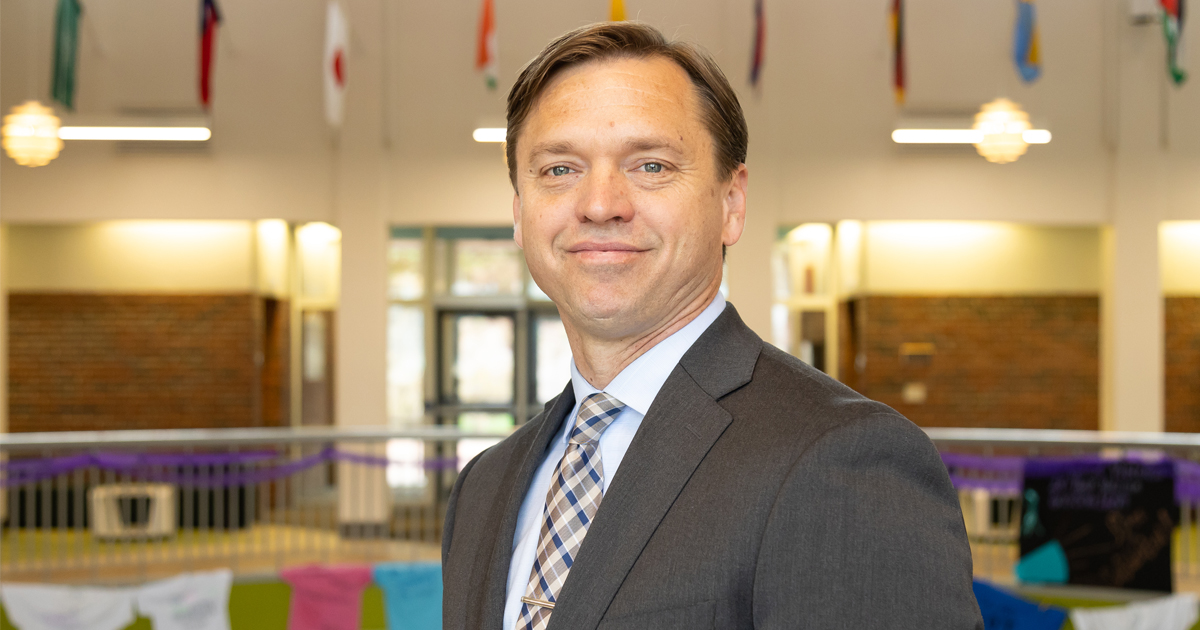
The issues that children, couples, and families are dealing with now are far different than those of ten years ago … or even five years ago. COVID-19, gun violence, divorce, and mental health issues are just some of the situations that have touched practically everyone in the past decade.
Stephen Flynn, professor of counselor education and supervision, makes sure his students are kept up to date in his classes in Clinical Mental Health Counseling, School Counseling, Marriage and Family Therapy, Educational Leadership, and School Psychology programs.
“Professor Flynn is always someone who tries to make the information in his class as relevant as possible, which I have always appreciated,” says Ivory Blanchette ’23G. “If the information is not applicable in the future, then he isn’t going to teach it.”
One part of Flynn’s “Working with Children and Families” course Blanchette particularly finds interesting is his TOA (Ticket of Admission) exercise. Students submit “reflection papers” based on a research-based article, discussing how the clinical information was presented and how it will relate to their future work as a counselor. The class then discusses the papers.
“Because the TOAs involve a dialogue with their peers about these issues and interventions, they have the opportunity to teach their classmates information that is key to their professional development,” says Flynn. “This gives them a sense of pride and the articles provide a bit of expert knowledge. This also benefits students by placing them in the provider role.”
Flynn recently wrote a textbook, The Couple, Marriage, and Family Practitioner: Contemporary Issues, Interventions, and Skills, and uses much of the book’s information in his classes, especially “Working with Children and Families.”
Flynn is well aware of how children’s and families’ issues are fluid and can change quickly. “According to various reports and national surveys, there was a need for information on recent issues. That’s why I wrote the book,” Flynn says. “Families are affected tremendously by the things that have taken place recently. Those are vulnerable populations, and I am helping train future practitioners.”
Some society issues don’t directly affect the New Hampshire population, but Flynn still makes sure to bring them to his students’ attention.
“Another thing I am also appreciative of is how culturally aware Professor Flynn is,” says Blanchette, who is in the marriage and family therapy graduate program. “We are in a college in a very, very white town in a white state. He always makes sure we understand the cultural competencies and have racial and ethnic awareness.”
Flynn’s on-campus contributions include chairing the Campus Transformation Leadership Team, a group created by the President’s Office to advance the University community as a whole. Faculty, staff, and students sit side-by-side in the CTLT, which welcomes students’ voices and opinions to consider changes on campus.
This year Flynn helped create the CTLT Spotlight, a news item that highlights faculty and staff ingenuity in the regular President’s Report. The intention is to boost morale and change the culture on campus, hoping to spark others to do the same.
Lauren Aparo ’24 was on CTLT with Flynn before he was named chair. She says that even then he was instrumental in making sure students’ voices were on the same plane as others. Aparo noted one issue he was a strong advocate for was making sure students had a normal college experience during the COVID pandemic.
“Professor Flynn is awesome. He is a real support for the student’s voice,” says Aparo, who is majoring in psychology and minoring in history. “We were able to facilitate and create ideas to pass on to appropriate groups on campus, with the hopes they would come to fruition.”

